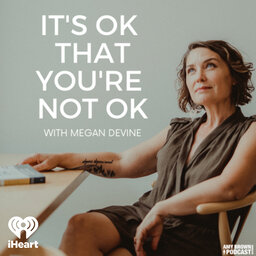Holiday Debrief: Ghosting Therapists, New Year’s Breakups, and Holiday Angels
The holidays are over - you made it. By the looks of our inbox, the season wasn’t easy. This week, a holiday debrief, including bad behavior from therapists, why religion is not the answer to grief, and some true facts about dating after loss.
In this episode we cover:
- How to say “I can’t work with you” without accidentally shaming your patients or clients
- Why “but your (dead relative) is all around you, just in a new form!” maybe isn’t the most supportive thing to say
- Questions to ask yourself when faced with a surprise romantic breakup (and what that has to do with grief)
- And as always - fun talk about boundaries.
We're re-releasing some of our favorite episodes from the first 3 seasons. This episode was originally recorded in 2022.
Want to become a more grief-informed, human-centered therapist or provider? Registration is open now for Megan Devine’s 6 month online Grief Care Professional Certificate Program. Details at this link.
Follow our show on Instagram, Facebook, Twitter, and TikTok @refugeingrief and @itsokpod on TikTok. Visit refugeingrief.com for resources & courses.
About Megan:
Psychotherapist Megan Devine is one of today’s leading experts on grief, from life-altering losses to the everyday grief that we don’t call grief. Get the best-selling book on grief in over a decade, It’s Ok that You’re Not OK, wherever you get books. Find Megan @refugeingrief
Additional resources:
Looking for a creative exploration of grief? Check out the best selling Writing Your Grief course here.
Want to talk with Megan directly? Join our patreon community for live monthly Q&A grief clinics: your questions, answered. Want to speak to her privately? Apply for a 1:1 grief consultation here.
Check out Megan’s best-selling books - It’s OK That You're Not OK and How to Carry What Can’t Be Fixed
Books and resources may contain affiliate links.
 It’s OK That You’re Not OK with Megan Devine
It’s OK That You’re Not OK with Megan Devine


